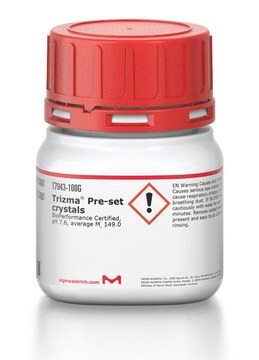G7294
Guanidine hydrochloride solution
8 M, pH 8.5, buffered aqueous solution
Synonym(s):
Aminoformamidine hydrochloride, Aminomethanamidine hydrochloride, GuHCl, Guanidine HCl, Guanidinium chloride, Guanidium chloride
About This Item
Recommended Products
form
buffered aqueous solution
Quality Level
concentration
8 M
pH
8.5
application(s)
diagnostic assay manufacturing
signalword
Warning
Hazard Classifications
Acute Tox. 4 Inhalation - Acute Tox. 4 Oral - Eye Irrit. 2 - Met. Corr. 1 - Skin Irrit. 2
Storage Class
8A - Combustible corrosive hazardous materials
wgk_germany
WGK 2
flash_point_f
Not applicable
flash_point_c
Not applicable
ppe
Eyeshields, Faceshields, Gloves, type ABEK (EN14387) respirator filter
Certificates of Analysis (COA)
Search for Certificates of Analysis (COA) by entering the products Lot/Batch Number. Lot and Batch Numbers can be found on a product’s label following the words ‘Lot’ or ‘Batch’.
Already Own This Product?
Find documentation for the products that you have recently purchased in the Document Library.
Customers Also Viewed
Our team of scientists has experience in all areas of research including Life Science, Material Science, Chemical Synthesis, Chromatography, Analytical and many others.
Contact Technical Service







